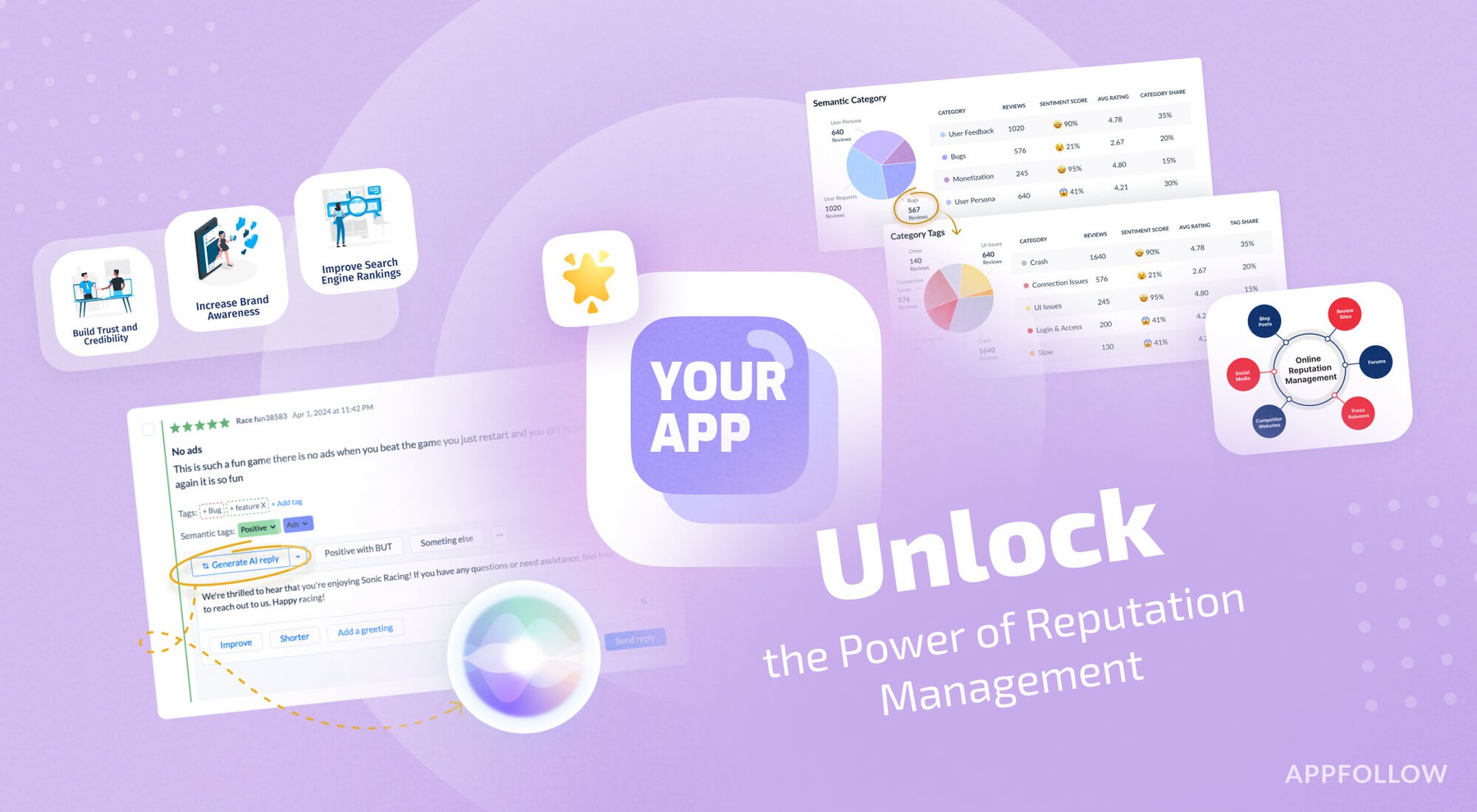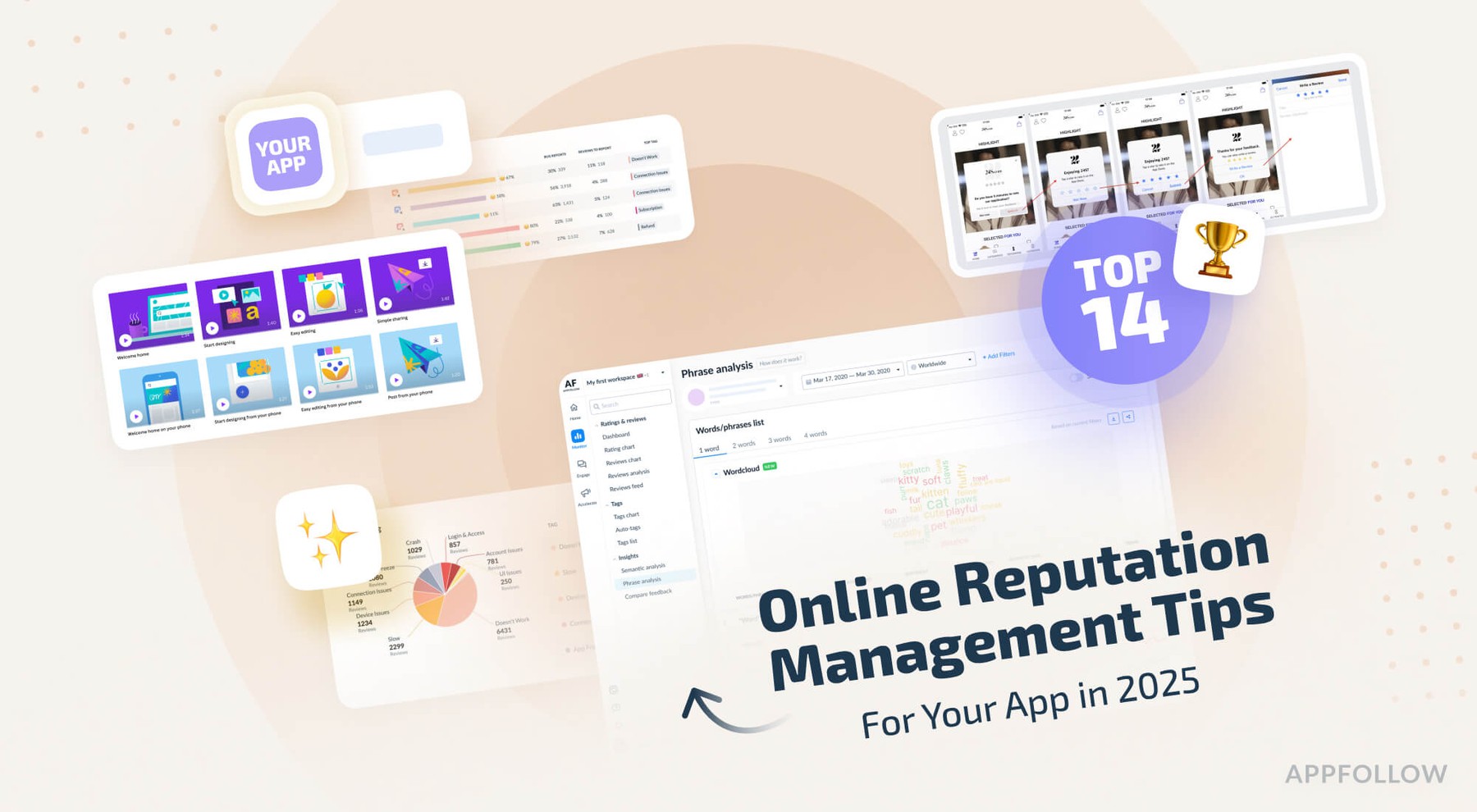Reputation Management Tactics & Tools to Protect Your App Brand

Table of Content:
- What is Reputation Management?
- Two Cycles of Online Reputation
- When to Focus on Reputation Management
- What If Things Go Really Bad?
- The Importance of Online Reputation Management for Apps
- How to Create a Reputation Management Strategy for Your App
- Top 5 Reputation Management Software for Your App
- 6 Best Practices For Your App’s Reputation in App Stores
- Protect Your App’s Reputation from Negative Trends
- Latest Trends in Reputation Management for Apps
- Action Plan: Simplify Brand Reputation Management for Your App
- FAQs
Mastering Reputation Management to Boost Your App’s Reputation
Your app lives or dies by its reputation. Bad reviews kill downloads. Good ones bring users.
Reputation isn't passive - it needs management. Every rating and comment shapes public perception. User opinion isn't just important, it's everything.
Want five stars? Take control. Respond to users. Turn complaints into loyalty.
This guide gives you proven tactics to build and protect your app's reputation. In this business, five-star ratings aren't optional - they're survival. Let's start.
What is Reputation Management?
If you were to define reputation management in the context of apps, it would sounds next:
Reputation management is the proactive strategy of monitoring, analyzing, responding to, and shaping the way users perceive your app through reviews, ratings, feedback, and overall user sentiment.
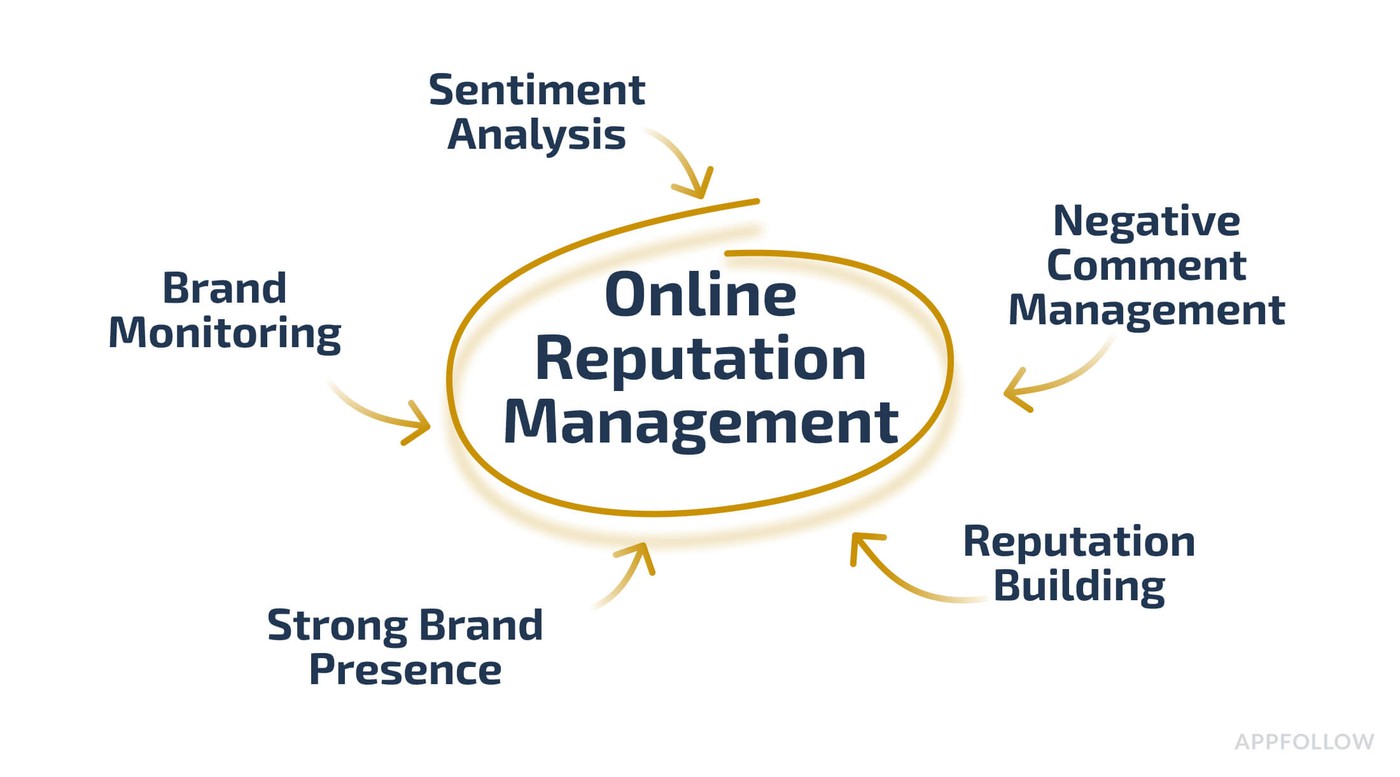
It’s the heartbeat of your app reputation.
Think of app store reputation management as an ecosystem made of four critical parts:
Reputation management definition. Image source.
- Review Monitoring. Constantly tracking user feedback to catch trends fast.
- Sentiment Analysis. Tagging reviews by sentiment and keywords — like crashes, payment bugs, or UX problems — to quickly identify critical issues.
- Strategic Response. Crafting smart, personalized replies to negative reviews, publicly showing you're on top of things.
- Data-Driven Improvements. Using insights from user feedback to guide product updates, bug fixes, and UX enhancements.
Here is how online reputation management process works in real life
Last spring, I had a client whose mobile app reputation started spiraling overnight after what seemed like a minor update.
Panic mode: activated.
When we checked AppFollow’s dashboard, sentiment analysis showed a wave of complaints about login crashes on Android 12 and iOS 15 — classic compatibility chaos. We quickly set up Slack and Jira integrations to alert devs instantly, publicly responded to every major review cluster, and released a hotfix within 48 hours.
Watching the deleted reviews data a week later — dozens of users who initially left angry 1-stars updated or deleted their reviews entirely, pushing ratings back up. The incremental ratings chart started trending positively, all thanks to rapid sentiment identification, precise technical fixes, and authentic, transparent responses.
So next time your client thinks app reputation management is just “replying to bad reviews,” send them my way — I’ve got stories, and coffee, for days.
Two Cycles of Online Reputation
Reputation doesn’t just sit still. It moves, shifts, and evolves in cycles.
Online reputation management = two key cycles define how an app’s reputation takes shape: the Reactive Cycle and the Proactive Cycle. Master these, and you’re in control. Ignore them, and your app reputation controls you.
The Reactive Cycle: Damage Control Mode
This is when things go south. Negative reviews pile up, app ratings drop, and suddenly, your brand reputation management efforts feel like a game of whack-a-mole. Users complain, bugs go viral, and if you’re not monitoring, issues spiral before you even notice. At this stage, you’re forced to:
- Respond to criticism — fast, or risk losing trust.
- Push updates to fix issues before they get worse.
- Try to rebuild your reputation, which takes time and effort.
It’s exhausting. It’s expensive. And it’s avoidable.
The Proactive Cycle: Growth Engine Mode
This is where you want to be. Instead of putting out fires, you manage reputation before problems arise. You engage with users, encourage positive reviews, and monitor feedback like a hawk. With app store reputation management, you turn reputation into a competitive advantage rather than a liability.
A proactive strategy means:
- Tracking sentiment before it affects downloads.
- Encouraging positive reviews to maintain high ratings.
- Fixing issues early to avoid a PR crisis.
So, which cycle are you in? And, more importantly, which one do you want to be in?
When to Focus on Reputation Management
The truth is, mobile app reputation isn’t just about fixing bad press — it’s about controlling your narrative. And timing matters. Companies don’t just need reputation management when things go south. They need it at every major app milestone.
1️⃣ Before Launch: Set the Stage for Success
First impressions matter. An app that debuts with weak credibility is fighting an uphill battle. To establish trust early, focus on:
- Optimizing your app store listing (keywords, screenshots, compelling descriptions).
- Generating buzz through beta testers and early adopters.
- Building social proof via influencers or pre-launch reviews.
2️⃣ After a Major Update: Control the Narrative
Even the best updates can backfire. A minor UX tweak? Suddenly, users are furious. A new feature? Someone always misses the old one. This is where managing reputation online becomes important.
- Monitor feedback to detect issues before they escalate.
- Respond fast to show users you’re listening.
- Highlight improvements to shift the conversation.
3️⃣ Handling Negative Reviews: The Smart Way
Every app gets negative reviews. Bugs slip through. Competitors leave fake reviews. Someone doesn’t like your UI. Whatever the cause, you need a reputation management process in place:
- Acknowledge issues instead of ignoring them.
- Offer solutions to show users you care.
- Encourage happy users to leave positive feedback.
With the right reputation management campaign, you can turn a one-star nightmare into a five-star comeback.
What If Things Go Really Bad?
Ever had a client slide into your DMs, totally panicked because their app ratings are tanking overnight? Yeah, been there — it’s literally every app marketer's worst nightmare.
Angry one-star reviews piling up, downloads nose-diving, revenue slipping — you name it. But listen, it’s fixable.
I reached out to my work bestie, Veronika Bocharova, — she's the guru behind Customer Success at AppFollow. Here’s exactly how she handles reputation management when a client's app hits rock bottom:
“First, don’t panic — negative ratings happen to everyone. Even the biggest apps go through this sometimes.
1️⃣ Start by zooming into your Ratings & Reviews dashboard. Pinpoint exactly when things went sideways.
2️⃣ Use sentiment and semantic tagging to rapidly identify repeating themes. We're talking about sudden crashes, failed logins, or that dreaded loading spinner that just won’t quit. Usually, you’ll find an update or backend tweak triggered this avalanche.
3️⃣Once you've found the culprit, immediately set up automated alerts and integrations with Slack or Jira. Dev teams live in these tools. Getting critical feedback to them in real-time means faster fixes.
4️⃣Publicly respond to key negative reviews, too. Users need to see you’re actively addressing their concerns — transparency is crucial for solid online reputation management.
And seriously, don't overlook your deleted reviews data. If users revise or remove negative reviews after your fixes, that's proof your response strategy is paying off.
5️⃣ Also, keep a close eye on incremental rating changes. Watch out for discrepancies between Google Play Console, App Store Connect, and AppFollow’s data — especially Google’s incremental rating lags.
Being proactive, structured, and transparent is your golden ticket back to stellar app reputation. You've totally got this!”
So next time your clients freak out, channel your inner Veronika. Grab your coffee, and confidently guide them through the storm.
The Importance of Online Reputation Management for Apps
A single bad review can drive users away. A strong online presence? That’s how you win.
Reputation management builds trust, boosts visibility, and drives downloads. Ignore it, and your app could sink.
Building Trust Through Online Reviews
Before they click "Install," users are checking reviews, ratings, and feedback. What they see shapes their first impression of your app.
A well-managed reputation ensures that initial impression works in your favor. By actively managing reviews, you not only showcase your app’s strengths but also address concerns promptly. When users see positive reviews, especially recent ones, they feel more confident. They trust that your app delivers on its promises.
Here are some elements of the reputation management process for gaining audience trust:
- Highlight positive reviews. Ensuring the best feedback is visible and boosting user confidence.
- Address negative reviews. Quickly and professionally, showing you care and are committed to improving.
- Engage with users. Regular interaction fosters a community feel, making users more likely to trust your brand.
A proactive reputation strategy builds trust and credibility with potential users.
Trust is everything. Without it, users won’t hesitate to swipe left on your app. Positive reviews act as social proof, showing potential customers that others have had great experiences.
Increased App Store Visibility
App stores love engagement. More reviews? They push your app higher in search results. A solid review management strategy ensures constant feedback, which increases your visibility where it counts.
Reputation management keeps reviews flowing and encourages users to leave their opinions. The more feedback you have, the more your app stands out.
- More reviews, better ranking. The more people talk about your app, the better it ranks in searches. It’s that simple.
- Star ratings boost search results. Higher ratings lead to better placement in app stores. More exposure equals more downloads.
- Constant feedback keeps you visible. With continuous, positive reviews, your app stays top-of-mind for users and on the radar for app store algorithms.
Better Conversion Rates
When users see great reviews, they feel confident clicking Download. A strong reputation reduces hesitation. When reviews are positive, your app gains momentum.
Reviews influence decision-making. A solid reputation means higher conversions. More users download, engage, and stick around.
Stronger Brand Loyalty
Reputation management isn’t just about gaining new users — it’s about keeping them. A great reputation can help you build long-term loyalty.
The more you show users you’re committed to their experience, the more loyal they become. Happy customers recommend your app, boosting your reputation online.
Faster Crisis Control
Mistakes happen. Bugs, crashes, or poor updates can trigger negative reviews. Without reputation management, the damage can snowball. Reputation management helps you stay on top of issues. Fast responses and proactive actions prevent problems from escalating.
How to Create a Reputation Management Strategy for Your App
You can build a gorgeous UI, ship weekly releases, and still tank your metrics if your app reputation takes a hit. This isn’t just about bad reviews — it’s about how fast you catch issues, how smart you respond, and how tightly your team is looped in.
If you’ve ever wondered how to manage your online reputation or asked yourself, “Wait, are we doing this right?” — you’re not alone. Here’s the strategy I walk through with every AppFollow client who’s serious about turning reviews into results.
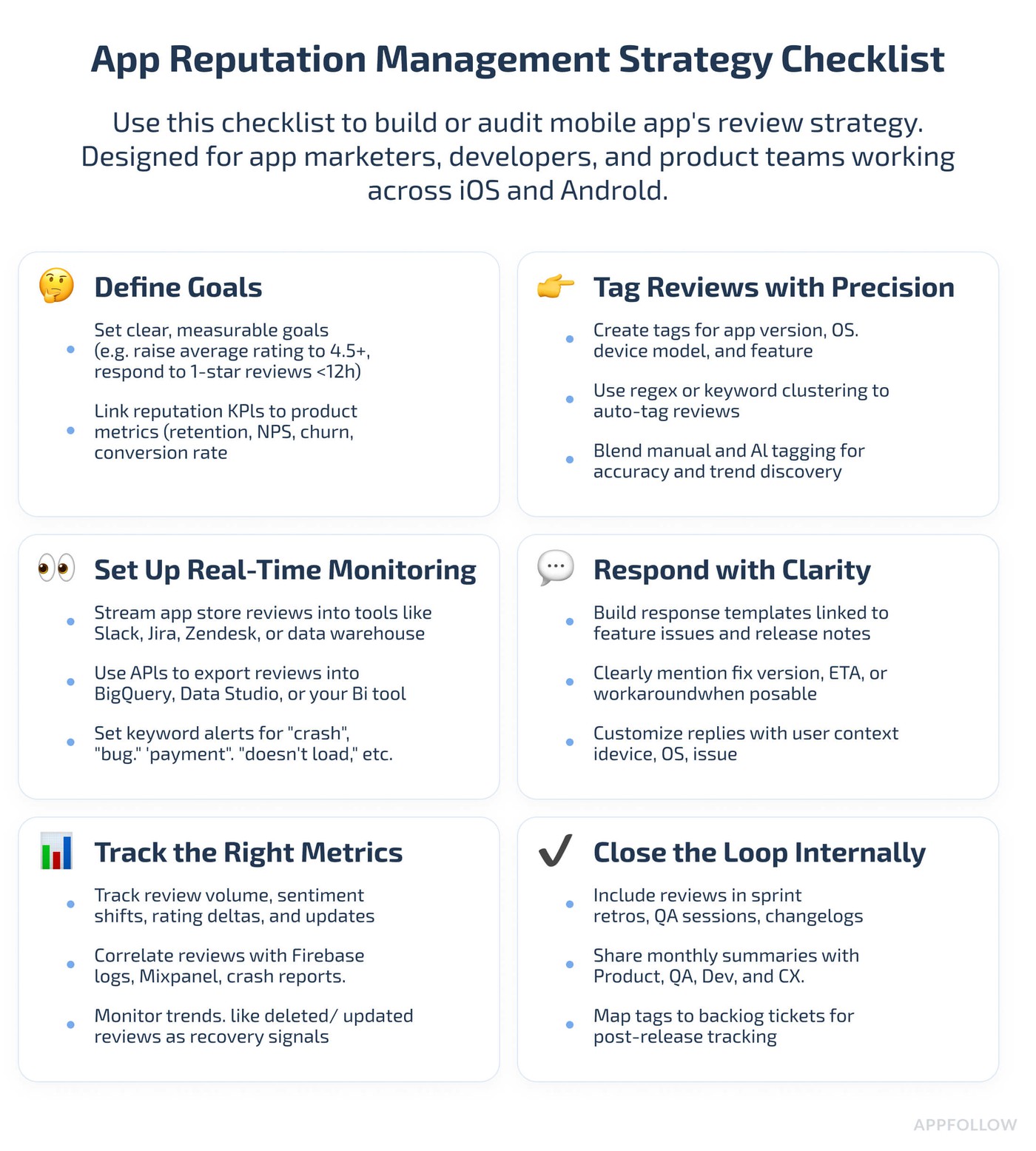
0️⃣ Define Reputation Management Goals
Before you worry about how to do online reputation management, get clear on what you’re aiming to fix.
Examples:
- Raise average rating to 4.5+ in top markets
- Cut response time for 1-star reviews to <12 hours
- Track sentiment by feature or OS post-release
- Recover 25% of negative reviews after hotfix
- Compare app store reputation vs. direct competitors
Use OKRs or connect goals to product KPIs like churn, CAC, or conversion lift.
1️⃣ Set Up Real-Time Review Monitoring
Stream reviews from both app stores into your daily workflows. Pipe them into Slack for Support, Jira for Devs, or directly into your data warehouse via API.
Use app store APIs to export daily reviews into AppFollow. Set up keyword alerts for “crash,” “won’t open,” or “payment failed” and monitor spike thresholds over 24h.
One SaaS app caught a regression bug from a 2% review spike — before Firebase flagged anything.
2️⃣ Tag Reviews with Precision
Tags aren’t just for sentiment — they're for isolating failure points.
Structure tags by app version, OS, device model, feature, and release window. Use keyword clustering models or regex to auto-tag reviews (e.g. ["login" + "error"] = auth bug). Manual triage can be combined with AI to refine logic over time.
One mobile bank mapped review keywords to feature owners — when “biometric login” tags jumped, they knew exactly who to assign it to.
3️⃣ Define Escalation Paths and Ownership
Decide who handles what. Support = standard queries, PMs = feature-level UX, Devs = technical incidents.
Route critical tags like “crash,” “refund,” and “blocked access” into your incident management pipeline. Use automations to assign tags to Jira epics, sprint boards, or specific Slack channels.
This isn’t just how to manage online reputation and reviews — it’s how to make them part of your engineering workflow.
4️⃣ Respond with Purpose, Not Apologies
Generic responses don’t build trust. Targeted replies do.
Create a response library mapped to known issues, feature updates, and fix versions. Personalize replies with dynamic variables like device, OS, and ticket status.
We’ve seen apps recover 1-star reviews within 72h just by clearly stating “Fixed in 3.2.2 — please update and confirm.”
5️⃣ Track the Right Metrics
Don’t just track your average rating — measure what changes behavior.
Blend app store data with backend analytics. Match review timestamps with Firebase crash logs or Mixpanel event drop-offs. Monitor:
- Review volume spikes by country
- Star rating delta before/after feature releases
- Keywords shifts (“slow” → “fast,” “ugly” → “clean”)
- % of reviews deleted or updated after a reply
This is how advanced teams manage online reputation with confidence — not guesswork.
6️⃣ Close the Loop Internally
Your users already told you what’s broken. Share that info.
Set up review-to-changelog mapping. When a feature gets fixed, include 2–3 review screenshots in the changelog doc. Push monthly summaries to internal dashboards (e.g. Metabase, Looker) with breakdowns by tag and resolution status.
One productivity app reduced repeat complaints by 40% just by routing reviews to product QA during grooming.
7️⃣ Benchmark Competitors
Pull top competitor reviews monthly. Cluster their 4–5 star reviews by “what’s working” keywords, and compare them to your 1–2 star complaints. Run sentiment diffs and tag comparisons.
Look at review velocity: if they’re gaining fast, they’re probably running UA or rolling out a sticky feature.
This is classic online reputation manager thinking — pattern recognition across the ecosystem.
8️⃣ Bake Reputation into Your Release Process
Add review monitoring and response prep to your pre-release checklist. Create a risk map by feature, estimate potential confusion points, and prepare reply templates in advance. In the first 24h post-release, prioritize manual review of all 1–3 star feedback.
The strongest teams release like reputation is part of the launch — not cleanup afterward.
Bottom line? If you’re serious about how to manage your online reputation, don’t silo it. Build systems. Automate smartly. Measure like an analyst. Review like a PM.
Top 5 Reputation Management Software for Your App
When managing your app’s reputation, the right tools can make all the difference. These top reputation management software options help you stay on top of online reviews, boost your presence, and tackle negative feedback effectively.
AppFollow

AppFollow is a reputation management and app monitoring platform, perfect for tracking reviews, managing feedback, and improving your app’s visibility in app stores.
It is the ultimate sidekick for app marketers and developers. With tools designed to simplify your reputation management plan, AppFollow helps you turn chaos into a streamlined reputation strategy that works.
Features:
- Review Management: Track, analyze, and respond to app store reviews in real-time.
- Sentiment Analysis: Understand user feedback at a glance.
- Performance Monitoring: Get insights on downloads, ratings, and revenue trends.
- Workflow Automation: Automate review responses and tasks to save hours.
- Custom Reports: Keep your team updated with actionable insights.
Pricing
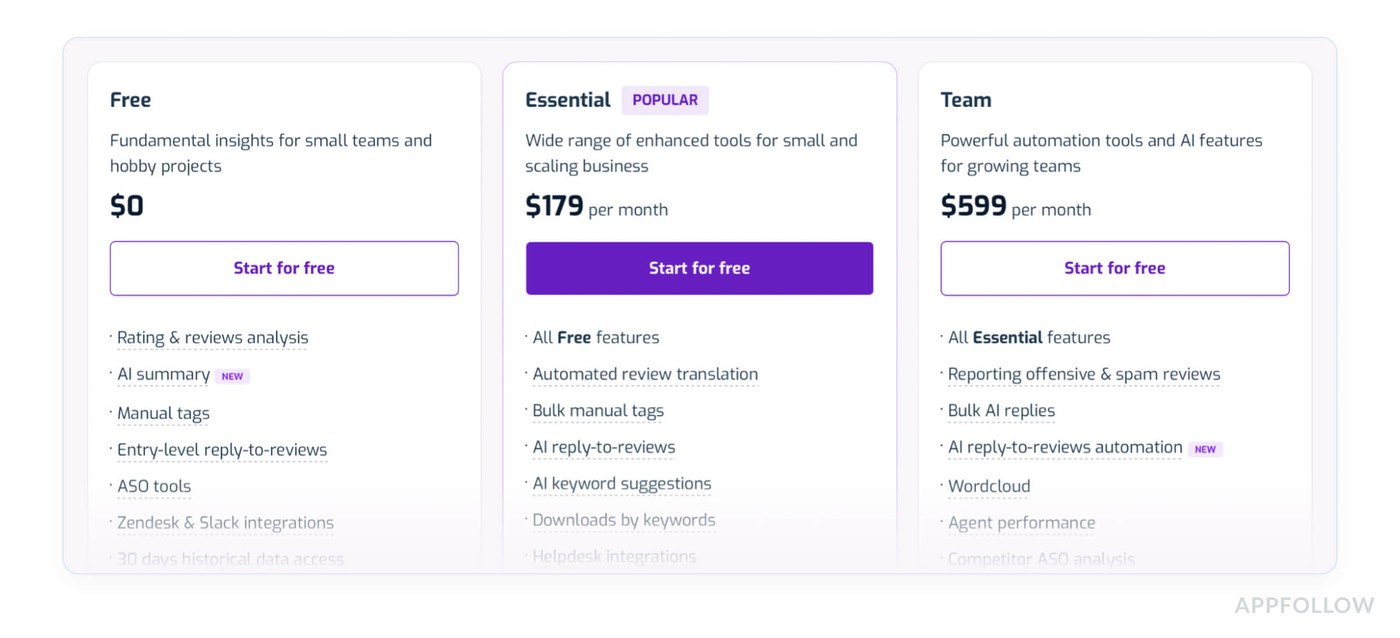
AppFollow offers a free plan with basic features and paid plans starting at $179/month. We also offer a 7-day free trial for premium features.
cta_get_started_purple
ReviewTrackers

Image source. ReviewTrackers dashboard.
ReviewTrackers is a powerful review management platform that centralizes feedback from all your online channels. It's designed to help businesses monitor and respond to reviews, boosting customer satisfaction.
- Social Listening. Track mentions across multiple social platforms.
- Sentiment Analysis. Get insights into customer emotions with automated sentiment tracking.
- Review Response Automation. Automatically generate responses to save time and ensure consistency.
Pricing

Image source. ReviewTrackers pricing.
ReviewTrackers offers location-based pricing, starting at $49 per location per month when paid annually. They also offer a free trial for 7 days.
Yotpo

Image source. Yotpo reviews dashboard.
Yotpo is a comprehensive platform for reputation management, focusing on gathering, managing, and analyzing reviews to drive customer trust and increase conversions.
- Review Generation. Easily ask for and collect reviews directly from users.
- User-Generated Content. Leverage photos and videos from customers in your marketing.
- AI-Powered Insights. Automatically analyze reviews for trends and insights with AI.
Pricing

Image source. Yotpo pricing.
Yotpo’s pricing varies, starting at $29/month, with a free trial available for 14 days. The pricing model scales based on review volume and feature access.
BirdEye
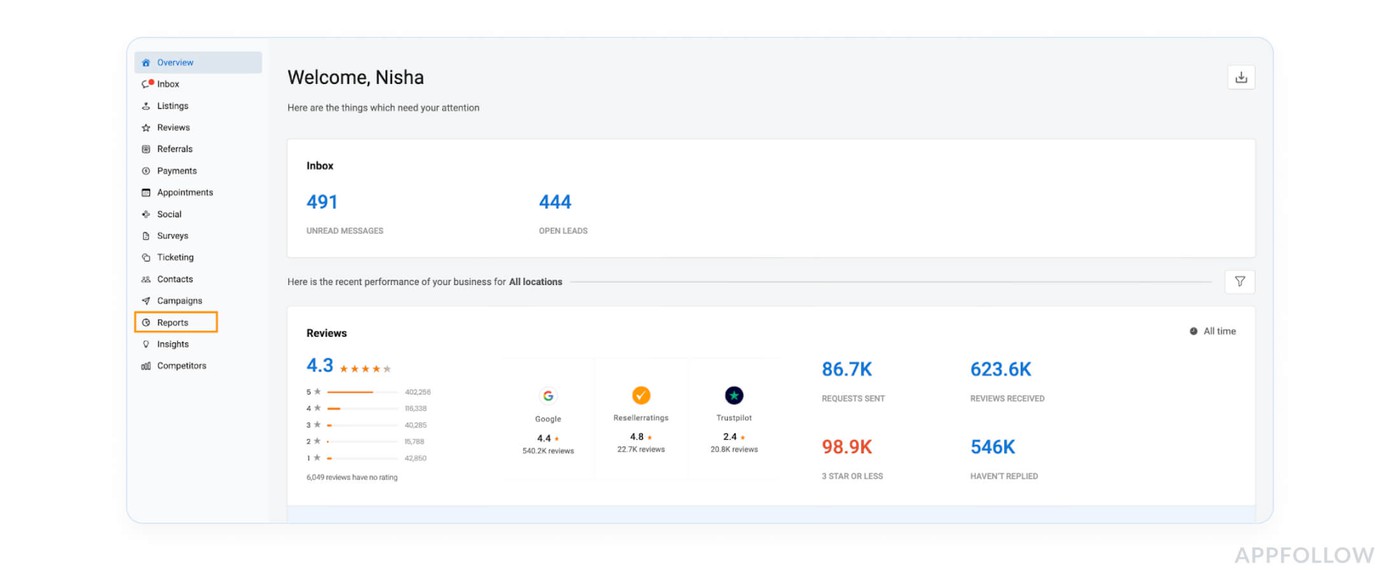
Image source. Birdeye dashboard.
BirdEye is an all-in-one reputation and review management software that helps businesses monitor and improve their online reputation across platforms.
- Multi-Platform Review Monitoring. Track reviews across hundreds of platforms.
- AI-Powered Sentiment Analysis. Understand customer sentiment instantly with AI tools.
- Customizable Review Reminders. Automate review request reminders and improve response rates.
Pricing

Image source. Birdeye pricing.
BirdEye starts at $299/month, with a 14-day free trial. The pricing model is based on the features you need and the number of reviews you’re managing.
Reputation.com

Image source. Reputation.com dashboard.
Reputation.com is a reputation management platform that provides tools to track reviews, monitor your online presence, and improve your brand’s image.
- Review Aggregation. Collect reviews from all major review platforms in one place.
- Negative Feedback Resolution. Set up automated workflows to resolve negative reviews.
- Analytics Dashboard. Gain valuable insights into your online reputation through a detailed dashboard.
Pricing
Reputation.com’s pricing is available upon request, offering a tailored solution for businesses of all sizes. They offer a 30-day free trial.
These tools offer different features based on your business needs. Whether you need AI insights, automated responses, or sentiment analysis, these platforms can help streamline your reputation management strategy. Pick one that fits your app's needs, and start growing your reputation today!
- Discover 5 more online reputation management software: Top 10 tools review!
A customer sentiment platform centralizes feedback from app stores, support channels, and social sources, allowing teams to monitor reputation health, detect risks early, and coordinate responses across departments.
6 Best Practices For Your App’s Reputation in App Stores
Nothing beats learning from the people who live and breathe app reputation management every day.
So, I reached out to some of the sharpest minds I know — our product, growth, support, and ASO specialists — and asked them to spill their best advice on managing reputation in real, high-pressure environments. Not theory. Not fluff. Just hard-won lessons, smart frameworks, and practical tactics that actually work.
1️⃣ When Ratings Drop, Look at Friction — Not Failures
Ilia Kukharev, Product Manager
“We once launched a redesigned dashboard that passed every QA check — and still triggered a wave of 1-star reviews. No crashes, no bugs. Just users not recognizing where their most-used feature had moved. That’s when we started treating reviews like UX test data.
Now, before every rollout, we prep a ‘reputation management report’: it includes likely complaints, how we’ll track them with our reputation monitor, and what copy we’ll test in-app to guide users through change.
If you want to manage reputation well, you need to understand that ratings aren’t about code quality. They’re about emotional friction.”
2️⃣ ASO Without Sentiment Monitoring Is a Conversion Trap
Yaroslav Rudnitskiy, Senior Professional Services Manager
“ASO teams often stop at visibility. But visibility paired with negative sentiment? That’s tanking conversions without anyone realizing it.
We once audited a finance app where their most-searched keyword appeared in 40% of 1–2 star reviews. People were finding the app — but getting disappointed. We rewrote metadata, repositioned the feature, and guided the support team to help control online reputation through review tone.
It worked. Installs rebounded, sentiment flipped, and that one keyword no longer undermined the brand. For true online brand reputation monitoring and management, sentiment is your missing layer.”
3️⃣ 3 Elements Every Technical Review Reply Must Include
Ilya Kataev, Professional Services Team Lead
“Three parts to every technical review reply:
- Acknowledge the issue (by feature or bug ID)
- State the fix (version, date)
- Close with action (update link or support path)
Skip any of these and you're gambling with trust. We created pre-mapped reply sets tied to known bugs and linked to our issue tracker. This system is now part of our online reputation management process. It takes guesswork out of managing reputation and makes technical communication scalable across support teams.
The result? A 22% increase in updated reviews.”
4️⃣ Localization Is Psychological, Not Just Linguistic
Dzianis Shalkou, Senior Professional Services Manager
“We once worked with a global marketplace app that treated Spanish as a monolith. But the online reputation management monitoring showed a different story: Mexican users appreciated informal, emoji-filled replies.
Spanish users didn’t.
Colombians valued speed and brevity.
Same language — three expectations. We implemented region-specific tone guides and adapted replies accordingly.
This added cultural layer to our business reputation management strategy lifted updated reviews by 30%. Local tone isn’t a nice-to-have — it’s a lever for reputation control.”
5️⃣ Deleted Reviews Are the KPI No One Is Watching
Veronika Bocharova, Customer Success Manager
“A deleted review is the quietest thank-you you’ll ever get.
We track deletions the same way other teams track NPS or churn. When they rise after a release, it means our company reputation management efforts are working. We even include deletion trends in our monthly reputation management report.
No praise. No follow-up. Just silence.
And in this world of noisy feedback, that’s one of the strongest signals you’ve successfully addressed the issue and regained trust.”
6️⃣ Tag Reviews by User Persona, Not Just Keywords
Lucija Knezic, Senior CSM & Product Strategy Manager
“A 1-star review from a power user is a roadmap alert. A 1-star from a first-time user is an onboarding flaw. But if you’re tagging reviews by topic only, you’ll miss the difference. We built a tagging model based on inferred personas using review text, device data, and session age.
This let us control our online reputation more intelligently, by seeing who was upset — not just what they said. Once we prioritized improvements for first-time users, updated ratings surged. Smart reputation control starts with knowing your audience — not just counting stars.”
Protect Your App’s Reputation from Negative Trends
One bug, one bad update, or one viral complaint can send your ratings crashing overnight. Managing online reputation isn’t just about reacting; it’s about staying ahead.
Identify Reputation Risks Early with Social Listening
Reputation issues don’t appear out of nowhere. They build up in negative reviews, support tickets, and social media complaints.
Spotting trends early is key to app reputation management. Use online reputation management monitoring tools to track common frustrations.
Is your app crashing after an update? Are users complaining about slow performance? Fix small issues before they turn into major problems. A slow app today is tomorrow’s 1-star disaster.
Address Reputation Crises with a Plan
When a crisis hits, time is everything. A major bug, data breach, or sudden wave of bad reviews can tank your brand reputation fast.
Having a reputation management process in place makes all the difference. First, identify the issue. Then, communicate clearly. Users don’t expect perfection, but they do expect transparency. Own the mistake, explain what’s happening, and share a timeline for the fix.
Stay Engaged with Your Users During Crisis Moments
Silence makes things worse. When users feel ignored, frustration grows, and so do negative reviews. Whether through app store responses, social media, or direct support, staying engaged is crucial.
A brand reputation manager knows that quick, thoughtful replies can turn an angry user into a loyal advocate. Social reputation management is about listening, responding, and showing that you care.
Offer Incentives for Positive Reviews During a Crisis
Not all users will abandon your app when things go wrong — some just need a little encouragement to speak up. Incentives like in-app perks, exclusive content, or discounts can encourage satisfied users to leave honest positive reviews.
Just be careful — fake reviews or aggressive requests can harm your reputation. Reputation control isn’t about tricking the system; it’s about reminding users why they love your app in the first place.
Latest Trends in Reputation Management for Apps
Reputation management is evolving fast. New tech, changing user behavior, and shifting app store algorithms make it a moving target. What worked last year? Might be outdated now.
Staying ahead means adapting. AI is reshaping how we track, analyze, and manage app reputation.
The Rise of AI in Reputation Management
AI is transforming reputation management. Keeping up with reviews, ratings, and feedback manually? That’s a thing of the past. AI-powered tools analyze thousands of reviews instantly, helping businesses stay ahead of reputation risks.
AI-driven sentiment analysis takes this to another level. It doesn’t just detect keywords — it interprets tone, intent, and recurring issues. Instead of wasting time sifting through endless reviews, you get clear insights that help you:
- Detect problems before they escalate. Identify recurring complaints and address them early.

- Focus on what truly matters. Filter out noise and prioritize critical feedback.
- Streamline responses. Automate replies while keeping a personal touch.

AI enhances control over your app reputation. With real-time insights, you can refine your strategy, boost positive sentiment, and keep your app store reputation strong.
The Impact of Video Reviews on App Reputation
Text reviews are still relevant, but video reviews? They hit differently. Seeing real users show app features, bugs, or frustrations carries weight.
Platforms like TikTok and YouTube are shaping app store reputation management. One viral complaint can tank ratings. But a glowing review? It can skyrocket downloads.
What does this mean for your mobile app reputation?
- Monitor video mentions, not just text reviews
- Engage with video creators to build trust
- Use influencer feedback to improve your app
Action Plan: Simplify Brand Reputation Management for Your App
Managing reputation isn’t just about responding to bad reviews — it’s about staying ahead of problems before they tank your app reputation.
Bugs, crashes, and frustrated users can spread negativity fast. AppFollow.io makes online reputation management easier, smarter, and way less stressful.
Reputation Monitoring, Simplified

Keeping track of user sentiment across multiple platforms is overwhelming. AppFollow.io centralizes everything:
- App store reviews. See all user feedback from Google Play and the App Store in one place.
- Social media mentions. Monitor what users say about your app beyond the store.
- Rating trends. Track how updates impact your ratings over time.
- Competitor insights. Compare your app reputation with industry benchmarks.
Instant Alerts for Reputation Control

One bad update can spiral into a reputation crisis fast. AppFollow.io’s real-time alerts help you:
- Catch critical bugs early. Fix crashes before they flood your reviews.
- Respond to negative feedback quickly. Stop a 1-star review from spreading.
- Track recurring complaints. Spot patterns before they hurt retention.
AI-Powered Sentiment Analysis

Not all complaints are equal. Some users just rant, while others highlight major issues. AppFollow.io’s AI-powered tools help by:
- Filtering noise from real concerns. Focus on what truly affects your mobile app reputation.
- Detecting reputation trends. Know if sentiment is improving or declining.
- Prioritizing urgent fixes. Address what matters most first.
Automated Responses for Faster Engagement

Engaged users leave better reviews. But manually replying to every comment? That’s impossible. AppFollow.io helps you:
- Automate review responses. Stay personal while saving time.
- Manage multiple languages. Respond globally with built-in translation.
- Show users you care. Turn frustrated users into loyal fans.
Reputation Reports That Matter

Data beats guesswork every time. AppFollow.io provides:
- Detailed reputation reports. Track progress and problem areas.
- Brand reputation analysis. Compare against competitors.
- Performance insights. See what’s working (and what’s not).
Reputation Management, Made Easy
Monitor, engage, improve. That’s how reputation management works with AppFollow.io. Stay ahead, control your online reputation, and turn problems into wins — effortlessly.
cta_get_started_yellow
FAQs
What’s the quickest way to turn around a bad reputation?
Act fast. Respond to every major complaint, fix glaring issues, and let users know you’re listening. Even better? Turn your biggest critics into loyal fans by actually solving their problems. A well-handled complaint can do more for your reputation than a dozen five-star reviews.
Should I respond to every negative review?
Not every single one — but the important ones? Absolutely. Silence = guilt in the court of public opinion. A professional, empathetic response can flip the narrative. Show potential users you care, fix real issues, and don’t feed the trolls.
What’s the biggest reputation killer for an app?
Neglect. Ignoring reviews, failing to update, or staying silent when users complain? That’s a fast track to irrelevance. A bad review won’t destroy you — but failing to respond might. Keep the conversation going, and your reputation will thank you.
Read also
- Managing your online brand reputation management isn't optional anymore, it's essential if you want to survive.
- Learn how reputation automation can save you time.
- See how mobile app store marketing intelligence helped Social Quantum boost installs by 110%.




